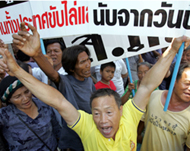Thai political chaos continues
Thailand looks set to remains in political limbo after the country’s top courts ruled that the election commission could not impose an October poll date and called for the commissioners to resign.

The supreme, administrative and constitutional courts decided after a one hour meeting that the commission was not qualified to propose an election date.
On Monday the commission proposed October 22 for a re-run of the April 2 vote, which was ruled invalid earlier this month by the country’s constitutional court.
The April poll was boycotted by Thailand’s three main opposition parties, meaning seats were unfilled and parliament was unable to elect a prime minister to form a government.
The vote was deemed undemocratic and therefore unconstitutional.
A spokesman for the supreme court, Jaran Pakdithanakul, said a date in October could not be set because only three of the five commissioners were present.
Royal intervention
He suggested that the commissioners’ resignation would be the way to end the political impasse.
Jaran told reporters: “If the EC does not resign, then the courts cannot guarantee a free and fair election. The EC must quit or they will be held accountable for any future damage to the country. There is no reason for this EC to keep organising the election.”
 |
|
The decision on the April 2 vote |
The courts were told to oversee the election by the popular King Bhumibol Adulyadej, marking the first time the judiciary has taken such an active role in Thai politics – an indication of the political malaise the country is in.
The election commission has received much of the blame for the chaotic April 2 vote.
Thaksin Shinawatra, the then prime minister, called the vote early in response to escalating opposition protests over his business dealings.
Although his party won the majority of seats, largely as a result of the opposition boycott, Thaksin stood down after the vote handing the day to day running of the country to his deputy.
Nonetheless Thaksin’s opponents believe he is planning a return to active politics.
For the time being he remains the country’s official prime minister.
Party officials have also suggested that because the April election was deemed unlawful, Thaksin might change his mind over his decision to quit.
Observers say such a move would risk sparking a return to the massive street rallies seen earlier this year.